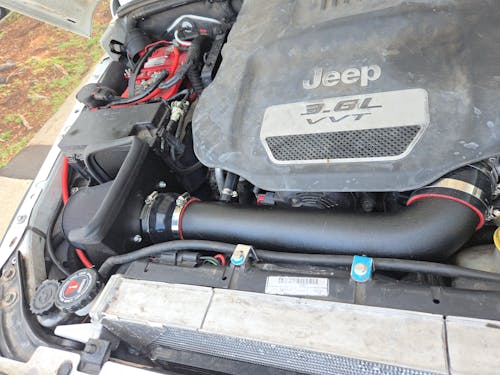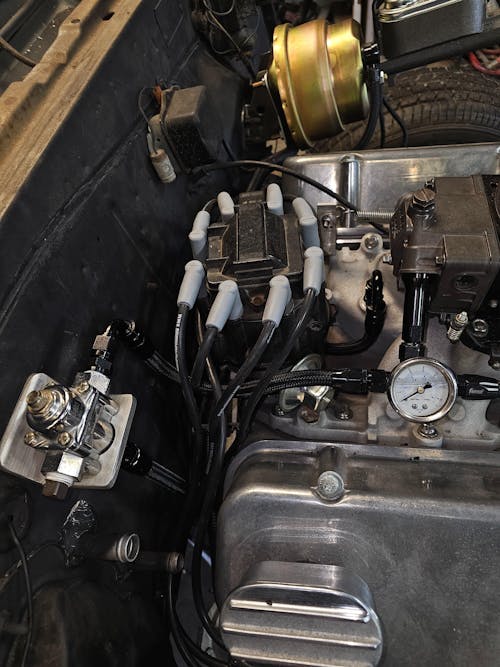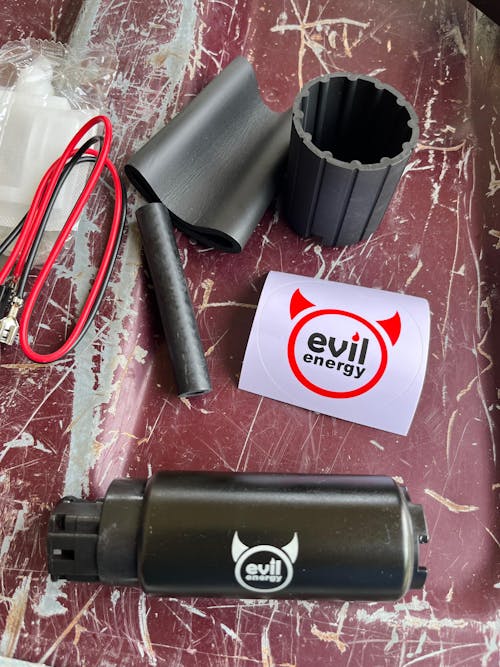-
EVIL ENERGY 6/8/10AN Billet Inline Fuel Filter 30 Micron Aluminum Black for Car EFI & Carb Fuel Systems---!@!start!@!---Specifications---!@!end!@!--- Brand EVIL ENERGY Color Black Type Inline Fuel Filter Size 6/8/10N Filter Element 30 Miron Width 2.07inch(52.6mm) Height 1.22inch(31mm) Material Aluminum Alloy,Stainless Steel Compatibility not compatible with E85 fuel Application various vehicles, including cars, motorcycles, and boats. Fuel Filter Series Fuel Filter...
- $19.99
- $19.99
$19.99- Unit price
- per
-
EVIL ENERGY 1/2inch,5/16inch,3/8inchBarb Billet Inline Fuel Filter 30 Micron Aluminum Black for Car EFI & Carb Fuel Systems---!@!start!@!---Specifications---!@!end!@!--- Brand EVIL ENERGY Color Black Type Inline Fuel Filter Size 1/2",5/16",3/8" Filter Element 30 Miron Width 2.07inch(52.6mm) Height 1.22inch(31mm) Material Aluminum Alloy,Stainless Steel Compatibility not compatible with E85 fuel Application various vehicles, including cars, motorcycles, and boats. Fuel Filter Series Fuel Filter...
- $19.99
- $19.99
$19.99- Unit price
- per
-
EVIL ENERGY Inline Fuel Filter with 6AN 8AN 10AN Adapter and Bracket Universal 10/30/40/100 Micron - Black
- $23.99
- $23.99
$24.99- Unit price
- per
-
Black
-
Silver Black
-
Blue
-
Red
-
EVIL ENERGY Fuel Injection In-Line Fuel Delivery Kit EFI External Frame Mounted Pump Kit
- $289.19
- $289.19
$319.85- Unit price
- per
-
EVIL ENERGY Fuel System Kit for LS Engines - Complete AN6 PTFE/CPE Fuel Line Kit with Regulator, Pump & Fittings
- $289.99
- $289.99
$189.99- Unit price
- per
-
EVIL ENERGY Fuel Filter Regulator 58 PSI Kit for LS Swap EFI Conversion
- $35.99
- $35.99
$44.99- Unit price
- per
-
EVIL ENERGY LS Swap Fuel Filter Regulator 58PSI with 6AN PTFE EFI Fuel Hose Kit
- $136.99
- $136.99
$189.99- Unit price
- per
-
EVIL ENERGY Universal EFI Fuel System Kit with PTFE Fuel Line and 10-Micron Fuel Filter
- $145.99
- $145.99
$165.99- Unit price
- per
-
EVIL ENERGY Fuel Filter Regulator 58 PSI Kit With 20FT PTFE/CPE Fuel Line compatible with 1999-2014 Chevrolet V8
- $168.99
- $168.99
$256.99- Unit price
- per
-
EVIL ENERGY Fuel Filter Regulator 58PSI Inline Fuel Pump with 6AN CPE 25FT Fuel Hose Kit
- $229.99
- $229.99
$189.99- Unit price
- per
-
EVIL ENERGY Full LS Swap EFI Fuel Setup with 300LPH Electric Fuel Pump, 20-120PSI Regulator, 6AN 20FT Fuel Hose and Filter
- $309.99
- $309.99
$397.99- Unit price
- per
-
EVIL ENERGY 3.5Inch Inline Fuel Filter 100 Micron with 6AN 8AN 10AN Adapter 50MM Universal for Car, Motorcycle and Boats---!@!start!@!---Specifications---!@!end!@!--- Brand EVIL ENERGY ID 0.8inch OD 1.25inch Housing Width 1.97inch Housing Length 3.5 inch Material Black Filter Element Rating 100 Micron Adapters Included AN6, AN8, and AN10 to AN10 ORB adapters Seal Structure Durable rubber O-ring (leak-free seal) Vehicles Compatibility Cars, motorcycles, boats...
- $22.99
- $22.99
$45.99- Unit price
- per
-
EVIL ENERGY Fuel Cell Tank Kit-Efficient Fuel System Solutions 5/10/15 Gallon
- $90.24
- $90.24
$123.99- Unit price
- per
-
EVIL ENERGY CPE/PTFE LS Swap fuel kit ,Fuel Filter, 6AN Fuel Line & Fittings | 20-120PSI Fuel Pressure Regulator | Fuel Pump
- $279.99
- $279.99
$390.99- Unit price
- per
-
EVIL ENERGY 15Gal Fuel Cell Master Kit , 300LPH Pump & 20 FT PTFE Lines - High-Performance Racing Upgrade
- $475.99
- $475.99
$502.99- Unit price
- per
-
EVIL ENERGY EFI Returnless Fuel System kit-Fuel Cell Gas Tank Fuel Filter with Fuel Pressure Regulator Adjustable
- $34.59
- $34.59
$166.98- Unit price
- per
-
EVIL ENERGY EFI Fuel Line Kit CPE Fuel Line 10 Micron Fuel Filter Return Style KitPRODUCT DETAILS Brand EVIL ENERGY Application Universal Material CPE Fuel Hose: Nylon, Synthetic Rubber,Stainless Steel, Fitting: Aluminum Hose Size 6AN 20FT/40FT Working Pressure 500 psi temperature range -40℉ to 257℉ Maximum Pressure 2000 Pound per Square Inch Min Bending Radius 63.5mm Fuel Filter specifications...
- $145.99
- $145.99
$165.99- Unit price
- per
Get an Exclusive 8% Off Your First Purchase
Subscribe now to get a gift with your first order!





![[CPE]](http://www.ievilenergy.com/cdn/shop/files/EVIL-ENERGY-Fuel-Cell-Tank-Kit-Efficient-Fuel-System-Solutions-5-10-15-Gallon-EVIL-ENERGY-141125253_165x.jpg?v=1763743749)
![[PTFE]](http://www.ievilenergy.com/cdn/shop/files/EVIL-ENERGY-Fuel-Cell-Tank-Kit-Efficient-Fuel-System-Solutions-5-10-15-Gallon-EVIL-ENERGY-141125361_165x.jpg?v=1763743749)
![[30-70PSI]](http://www.ievilenergy.com/cdn/shop/files/EVIL-ENERGY-Eco-Friendly-Fuel-Pressure-Regulator-6AN-EFI-Bypass-Return-Adjustable-30-70psi-Black_Red-EVIL-ENERGY-151921892_165x.png?v=1763746180)
![[30-70PSI,Black]](http://www.ievilenergy.com/cdn/shop/files/01_48_165x.png?v=1760696967)
![[Fuel Pump Kit]](http://www.ievilenergy.com/cdn/shop/files/1_EVKT0202451_PTFE_Hose_Kit_165x.jpg?v=1751867620)
![[Fuel Filter Regulator Kit]](http://www.ievilenergy.com/cdn/shop/files/1_EVKT0202451_Fuel_Filter_Regulator_Kit_165x.webp?v=1751867620)
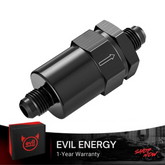
![[8AN]](http://www.ievilenergy.com/cdn/shop/files/EVIL-ENERGY-6AN-Billet-Inline-Fuel-Filter-30-Micron-Aluminum-Black-for-Car-EFI-_-Carb-Fuel-Systems-EVILENERGY-150998833_165x.jpg?v=1763745641)
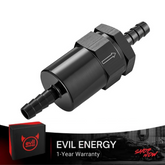
![[1/2"]](http://www.ievilenergy.com/cdn/shop/files/EVIL-ENERGY-1-2inch_5-16inch_3-8inchBarb-Billet-Inline-Fuel-Filter-30-Micron-Aluminum-Black-for-Car-EFI-_-Carb-Fuel-Systems-_Copy_-EVIL-ENERGY-151313750_165x.jpg?v=1763745800)
![[With Bracket]](http://www.ievilenergy.com/cdn/shop/files/1_f974ce04-b7ba-4647-acc8-931fb98401a0_165x.png?v=1745477125)
![[Without Bracket]](http://www.ievilenergy.com/cdn/shop/files/2_5cf4d5d4-261d-4029-a614-6ecd228a7a03_165x.png?v=1745477125)
![[Black,Without Bracket] black inline evil energy fuel filter with directional arrow and multiple AN fuel line fittings](http://www.ievilenergy.com/cdn/shop/files/40micron_af637a38-13c1-442e-9eec-1d04f3047f15_165x.png?v=1740549892)
![[Black,With Bracket] black inline evil energy fuel filter with directional arrow and multiple AN fuel line fittings](http://www.ievilenergy.com/cdn/shop/files/10_micron_165x.png?v=1763031693)
![[Antistatic PTFE] EVIL ENERGY Fuel Injection In-Line Fuel Delivery Kit - Complete Set with Free Shipping + 180-Day Return](http://www.ievilenergy.com/cdn/shop/files/1-KT11423BB-AMZ1_499ced5e-15c0-439c-a929-e540ff7ad4b9_165x.jpg?v=1755496834)
![[PTFE] EVIL ENERGY Fuel Injection In-Line Fuel Delivery Kit - Components & Packaging](http://www.ievilenergy.com/cdn/shop/files/1-KT11423BB-AMZ1_165x.jpg?v=1755496834)
![[CPE]](http://www.ievilenergy.com/cdn/shop/files/EVIL-ENERGY-Fuel-System-Kit-for-LS-Engines-EVIL-ENERGY-155144264_165x.jpg?v=1763746433)
![[PTFE]](http://www.ievilenergy.com/cdn/shop/files/EVIL-ENERGY-Fuel-System-Kit-for-LS-Engines-EVIL-ENERGY-155144363_165x.jpg?v=1763746436)
![[30-70PSI]](http://www.ievilenergy.com/cdn/shop/files/ptfe_fuel_line_fitting_165x.png?v=1748411507)
![[20-75PSI&75-120PSI] fuel filter](http://www.ievilenergy.com/cdn/shop/files/evil_energy_fuel_filter_165x.png?v=1748411507)
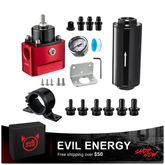
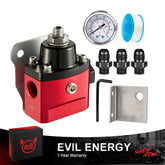
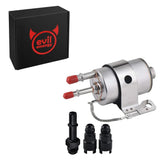

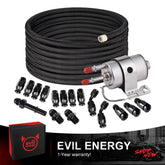

![[PTFE]](http://www.ievilenergy.com/cdn/shop/files/6a0f48436f03bf48e8c7f28f9f150b4c_c6c70bcd-ea17-418e-96e9-55ce10a78b21_165x.png?v=1735211812)
![[CPE]](http://www.ievilenergy.com/cdn/shop/files/6a0f48436f03bf48e8c7f28f9f150b4c_19302f29-bdaf-4dcf-9b82-7b4da85f87ef_165x.png?v=1735211814)
![[CPE]](http://www.ievilenergy.com/cdn/shop/files/1_56a15d6a-f977-48f8-bd78-792918db6475_165x.jpg?v=1757323630)
![[PTFE]](http://www.ievilenergy.com/cdn/shop/files/1-2_c7bd5efa-b487-4637-8c65-52b1b1155a4a_165x.jpg?v=1757323630)
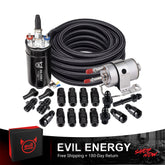

![[CPE]](http://www.ievilenergy.com/cdn/shop/files/EVIL-ENERGY-LS-Swap-Fuel-Kit-_-Fuel-Filter_6AN-20FT-Fuel-Hose-_20-120PSI-Regulator-_-300LPH-High-Flow-Fuel-Pump-For-LS-Swap-EFI-Systems-and-More-_Copy_-EVIL-ENERGY-139826211_165x.jpg?v=1763743548)
![[PTFE]](http://www.ievilenergy.com/cdn/shop/files/EVIL-ENERGY-LS-Swap-Fuel-Kit-_-Fuel-Filter_6AN-20FT-Fuel-Hose-_20-120PSI-Regulator-_-300LPH-High-Flow-Fuel-Pump-For-LS-Swap-EFI-Systems-and-More-_Copy_-EVIL-ENERGY-139826366_165x.jpg?v=1763743552)
![[With Bracket]](http://www.ievilenergy.com/cdn/shop/files/1_24ba805e-fb5b-42fa-a398-eeba35f13f97_165x.png?v=1755586823)
![[Without Bracket]](http://www.ievilenergy.com/cdn/shop/files/2_eba7f71b-ad14-4cfa-9042-eb6eb06ad7d8_165x.png?v=1755586823)
![[CPE]](http://www.ievilenergy.com/cdn/shop/files/EVIL-ENERGY-CPE-PTFE-LS-Swap-fuel-kit-_Fuel-Filter_-6AN-Fuel-Line-_-Fittings-_-20-120PSI-Fuel-Pressure-Regulator-_Inline-Fuel-Pump-EVIL-ENERGY-141129965_165x.jpg?v=1763743806)
![[PTFE]](http://www.ievilenergy.com/cdn/shop/files/EVIL-ENERGY-CPE-PTFE-LS-Swap-fuel-kit-_Fuel-Filter_-6AN-Fuel-Line-_-Fittings-_-20-120PSI-Fuel-Pressure-Regulator-_Inline-Fuel-Pump-EVIL-ENERGY-141130074_165x.jpg?v=1763743806)
![[10&100 Micron] EVIL ENERGY Fuel Cell Gas Tank Kit with 15-Gallon Aluminum Tank, 300LPH Fuel Pump, PTFE Lines, Filters, and Fittings for High-Performance Vehicles](http://www.ievilenergy.com/cdn/shop/files/EVIL-ENERGY-15Gal-Fuel-Cell-Master-Kit-_-300LPH-Pump-_-PTFE-Lines-High-Performance-Racing-Upgrade-_Copy_-EVIL-ENERGY-150388063_165x.jpg?v=1763745285)
![[30&100 Micron] 15-Gallon EVIL ENERGY Aluminum Fuel Cell Gas Tank Kit with AN10 Fittings and Built-In Level Sensor for Automotive Fuel Systems](http://www.ievilenergy.com/cdn/shop/files/EVIL-ENERGY-15Gal-Fuel-Cell-Master-Kit-_-300LPH-Pump-_-PTFE-Lines-High-Performance-Racing-Upgrade-_Copy_-EVIL-ENERGY-150388169_165x.jpg?v=1763745288)
![[5 Gallon,30-70PSI,10 Mircon] EVIL ENERGY Fuel Cell Kit with regulator, inline pump, AN fittings, and installation accessories - high-performance fuel cell solution for EFI systems](http://www.ievilenergy.com/cdn/shop/files/first_165x.jpg?v=1753689299)
![[Without Fuel Filter,Without Fuel Pressure Regulator] EVIL ENERGY aluminum fuel cell tank – black high-capacity racing fuel cell for automotive performance applications](http://www.ievilenergy.com/cdn/shop/files/Black_and_White_Illustrated_Car_Parts_Retail_Instagram_Post_165x.png?v=1753689299)
![[CPE]](http://www.ievilenergy.com/cdn/shop/files/6a0f48436f03bf48e8c7f28f9f150b4c_5248f16d-1475-45ac-a2d7-d66e5aba6194_165x.png?v=1735211819)
